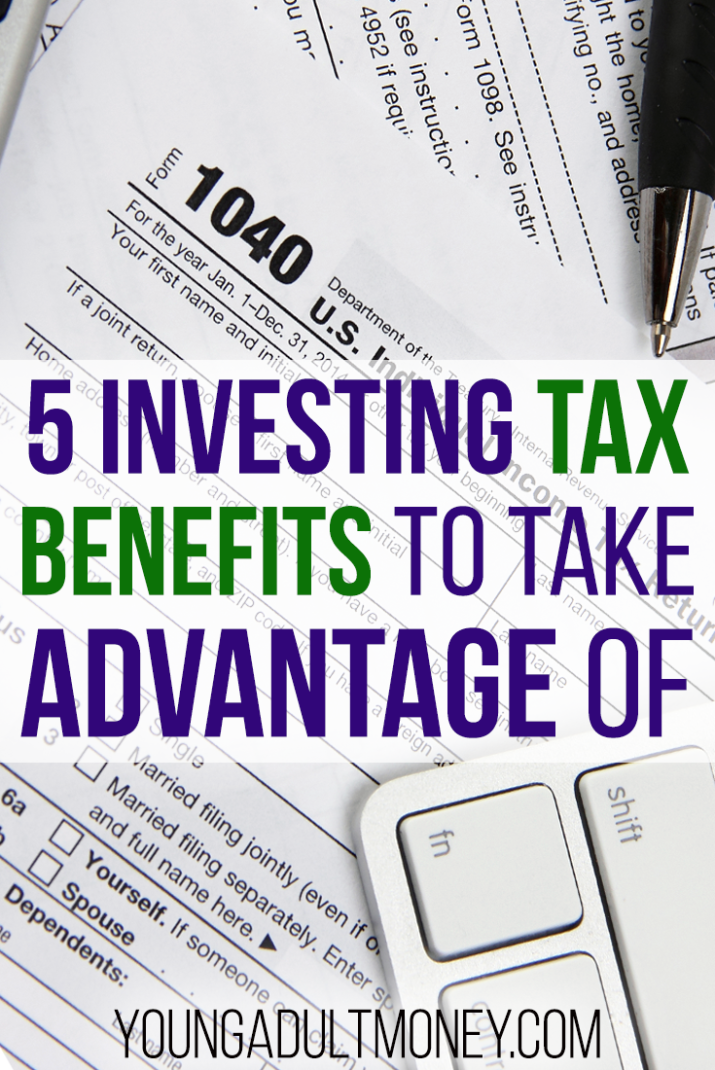 This post is part of our series 7 Weeks to Your Best Finances.
This post is part of our series 7 Weeks to Your Best Finances.
This series is meant to serve as a 7-week path to improving your finances. It will cover all the important topics like starting a budget, saving money, making money, investing, and more.
To find out more and see all the tips and ideas for improving your finances check out the dedicated 7 Weeks to Your Best Finances page.
Tax season is upon us and while this may not be your favorite time of year, you can make filing your taxes less painful by taking advantage of some tax breaks if you invested last year.
The U.S. tax code includes many benefits and tax breaks for investors that you should take advantage of.
In this post, I’ll highlight and simplify some of the best investing tax benefits so you
1) Lower Your Tax Bill With 401(k) Contributions
When you contribute to your 401(k) for retirement, you do so with pre-tax dollars from your paycheck which then causes your taxable income to decrease.
As of 2016, if you are under 50 years old, the maximum contribution amount is $18,000 and if you are 50 or older, you can make an additional catch-up contribution of as much as $6,000 for a total of up to $24,000. This year, the limits are bound to go up to keep up with inflation.
Contributing to retirement is always a great habit to get into but it can really pay off in terms of lowering your taxable income so you which will also reduce the amount you have to pay in taxes.
While your 401(k) contributions are taxed in retirement, there are different tax brackets for each portion of your income you withdraw which is why an employer-sponsored 401(k) plan is best for individuals who plan on having a lower income than their current income during retirement.
Related: How to Start Investing In Your 20s
2) Claim the Retirement Saver’s Credit
If you contribute to a 401k, 403(b), 457 plan, a Simple IRA, Traditional IRA, Roth IRA or a SEP IRA, you may be able to qualify for the Retirement Saver’s Credit formerly known as the Retirement Savings Contribution Credit.
Depending on your income and filing status, with this credit, you can claim 50%, 20%, or 10% of the first $2,000 you contribute during the year to a retirement account which makes the maximum credit amounts that can be claimed $1,000, $400 or $200.
Generally, the higher your income is, the less of the credit you’ll be able to claim and you’ll need to file using a 1040A, 1040 or 1040NR to claim the credit.
For 2016 contributions, the maximum adjusted gross income for Savers Credit eligibility is $61,500 for a married couple filing jointly, $46,125 for a head of household, and $30,750 for all other taxpayers.
It’s also a non-refundable credit meaning while it can reduce the tax you owe to zero, you still won’t get a refund.
3) Local Exemptions for Municipal Bonds
When you purchase a municipal bond, you’re actually lending money to a state or local government entity and the money is used to do things like build schools, highways, hospitals etc.
In turn, the government promises to pay you back a specified amount of interest (usually paid out twice per year) and return the principal to you at on a specific maturity date.
If you have municipal bond ETFs or mutual funds, a portion of the dividends paid by mutual bond funds may be exempt from state and local tax which could leave more money in your pocket.
The rules vary from state-to-state, so you’ll need to speak with your accountant or tax adviser to make sure see if an exemption applies in your situation.
4) Reinvested Dividends
This isn’t really a tax credit or deduction, but simply a tip that can help you save if you have mutual fund dividends that are automatically reinvested and used to buy additional shares.
You should also include reinvested dividends to your tax basis because it can reduce the taxable capital gain (or loss) when you redeem shares. If you forget to do this, you could end up paying taxes twice on dividends – once when they are paid out and reinvested and again when they’re included in the proceeds of the sale.
If you invest with a brick and mortar or online brokerage firm, they may already track this for you but it’s good to be on the safe side and double check.
5) HSA Triple Tax Advantage
If your employer offers you a high-deductible health care plan, you may want to consider opening an HSA (Health Savings Account). Contributing to an HSA is a tax-efficient way to save and pay for current and future qualified medical expenses including expenses that pop up during retirement.
The maximum annual contribution that can be made for 2016 is $3,350 for individuals enrolled in self-only coverage and $6,750 for individuals enrolled in family coverage.
Individuals over the age of 55 can also make catch-up contributions.
Having an HSA can provide you with a triple tax advantage in the forms of contributions, earnings, and withdrawals.
For starters, HSA contributions are treated as pre-tax so every dollar you contribute is a reduction in taxable income. Next, qualified medical expenses aren’t taxed.
Once you have money in an HSA account you can use it for what the IRS considers “qualified” medical expenses and the amount you use is untaxed.
The third tax benefit includes the fact that investment gains aren’t taxed. If you don’t use all the money in your HSA each year, you can invest it and As long as you use the funds for qualified medical expenses, these gains are not taxed.
Why an HSA Is The Absolute Best Retirement Account
Investing Can Pay Off
Investing tends to pay off in more ways than one. By investing you can do things like build wealth and prepare for retirement, but you can also take advantage of some of the beneficial tax advantages as well.
Try to max out your retirement and HSA (if you have one) accounts each year and be sure to talk to your tax advisor to learn more about the specific investing tax benefits you can take advantage of when you file your taxes.


In addition to these tax advantages, it’s also worthwhile to mention that income from investments are also taxes at preferential rates as well as compared to wage, business income or interest income. Dividends and capital gains are taxed at only 0%,15% or 20%, whereas regular income can be taxed up to 39.6%. Plus, there are no FICA taxes due on investment income like there are on wage and business income. We talk about compound interest in investments all the time, but the tax breaks for investing really help a lot to grow that money over time!
I don’t think HSA’s can be mentioned enough-such great investment vehicles!
HSAs are my favorite and I agree with your other points. Tax breaks for your investment income could really be discussed more as well.
Great list, Chonce! We take advantage of all of the above, with the exception of the muni-bonds. But I’ve actually been thinking about them more recently as an option for additional tax advantaged savings.
the more tax-advantaged savings, the better in my opinion as long as it fits in with your overall plan.
This is a great list Chonce! I think the only one we’ve not taken advantage of is #3. Investing has so many benefits, obviously, but I feel the tax benefits are one of the most commonly overlooked ones of all – especially when you look at something like a 401(k) where you can get free money through a match in addition to the tax benefit. Another option I’d add is to look into a SEP or an Individual 401(k) if you have a side hustle or run your own business – it’s a no-brainer in my opinion.
Yes, it is a no brainer. Now that I’m self-employed, I’ll definitely be looking into the SEP myself
interesting article:D
Thanks for reading Giulia!
HSA’s are an incredible tool especially for tax savings. The fact that you have a choice to invest some of your HSA funds in stocks and bonds and the like is huge. If you’re relatively healthy and can a high deductible plan is right for you, maxing out your HSA is a no brainer. You’ll have a nice chunk of change in just a few years.
Well said! I’m not crazy about high deductible plans but I do love our HSA and we don’t go to the doctor much so it’s a decent trade-off I suppose.
My wife and I have continually increased our 401k contributions. I think I’m finally maxing mine out. Since the contributions come out before taxes, the hit is not that bad. Plus, once the money is out of sight and out of mind, it can grow pretty quickly.
That’s what I love about 401(k) plans. I don’t have one but my husband does and I love how his company matches contributions as well.
Great information, Chonce! We are definitely planning to be in a lower tax bracket in retirement so we are not concerned about paying taxes upon withdrawal. It’s good to know the pros and cons of paying the taxes before or after investing. And HSAs are the best–I wish our new employer offered them.
That’s good to hear! I’m pretty sure I will be in a lower tax bracket too when I retire since I’m already so used to living well on less.